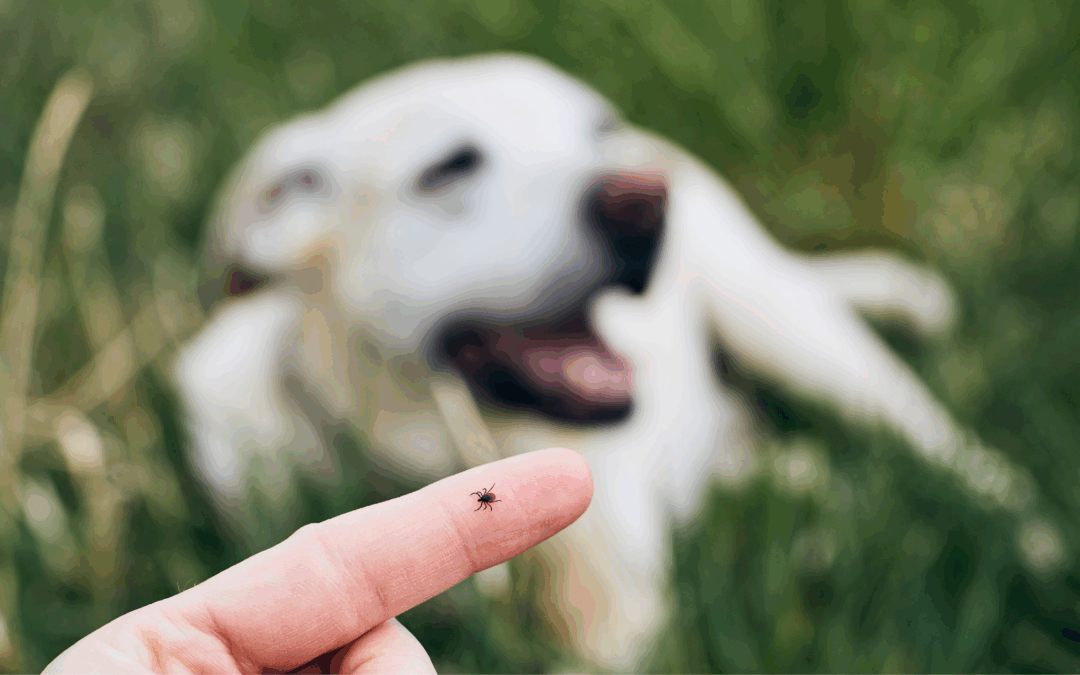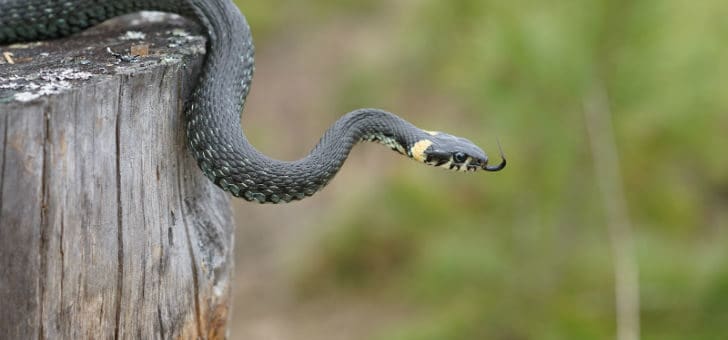READY TO GET STARTED?
REQUEST A FREE ESTIMATE
Fill out the form below or call (336) 226-1448 for a free, no-obligation estimate.

Ticks are more than just an outdoor nuisance in North Carolina. These tiny parasites can carry serious diseases, like Lyme disease and Rocky Mountain spotted fever, making them a health concern for both families and pets. With the region’s warm, humid climate, ticks thrive year-round, so proactive prevention is key to staying protected. While there are steps you can take to reduce ticks in your yard and home, nothing beats the expertise of a professional pest control company. With customized solutions and specialized treatments, pest control experts can effectively protect your property from ticks. Here’s how you can partner with a pest control company while staying proactive at home to prevent ticks in North Carolina.
Getting rid of ticks often requires more than just mowing your lawn or applying DIY remedies. Here’s why hiring a pest control company is often your best defense.
Pest control professionals understand tick behavior and their specific hotspots in North Carolina. They’ll assess your property for common breeding grounds, like tall grass, wooded areas, and shaded spots, and provide treatments tailored to your home’s needs to help you prevent ticks in North Carolina.
Store-bought repellents and DIY sprays can manage ticks temporarily, but professional treatments go deeper. Pest control companies use proven products and methods, such as perimeter sprays and tick barriers, designed to reduce tick populations over the long term.
Ticks are a health hazard, and even a single bite can pose risks. Professional pest services provide comprehensive solutions that eliminate the threat of ticks without compromising the well-being of your loved ones.
Instead of spending countless hours trying to identify and manage tick issues, you can leave it to the experts. Pest control companies not only save you time but also provide peace of mind by ensuring the problem is handled securely and effectively.
Even with professional pest control services, there are actions you can take to make your home and yard less inviting to ticks.
A well-maintained yard reduces tick habitats and makes professional treatments even more effective.
When spending time outdoors, take simple precautions to keep ticks off yourself and your family.
Ticks are a common issue for pets, particularly dogs and outdoor cats. Keep them protected by adopting these measures:
When you partner with a professional pest control company for tick prevention in North Carolina, you gain access to advanced methods designed for total protection.
Eco-friendly sprays applied to the perimeter and foliage of your yard target tick breeding areas without harming beneficial insects or plants. These treatments drastically reduce tick populations while keeping your property healthy for kids and pets.
Some pest control providers offer physical barriers, such as targeted mulch or fencing, to further reduce ticks migrating into your yard from wooded or overgrown areas.
Many pest control companies offer year-round plans that include routine inspections and treatments, ensuring your home stays tick-free no matter the season. With expert monitoring, tick populations won’t get the chance to grow unnoticed.
Keeping your home tick-free is essential for your family’s protection and health, and professional pest control services provide the most reliable, long-term protection. By combining your own prevention steps with expert solutions, you’ll create an environment that ticks simply can’t thrive in.
Don’t wait until ticks become a problem. Reach out to a trusted pest control company today to protect your loved ones and enjoy North Carolina’s beauty without the worry of ticks. Investing in professional tick prevention is the best way to ensure your home stays a healthier, more comfortable place year-round! Contact a pest control company near you today to get started and prevent ticks in North Carolina.

North Carolina’s warm, humid climate often invites flies into homes, creating a frustrating problem. Thankfully, you can significantly reduce the risk of fly infestations with these five practical steps.
Flies are drawn to food and waste, so maintaining cleanliness is crucial.
Flies can slip through even the smallest cracks.
Outdoor breeding grounds often lead to indoor fly issues.
Target what draws flies in to make your home less inviting.
When flies persist, add extra measures to stop them.
By combining cleanliness, proper sealing, and proactive outdoor maintenance, you can create an environment that flies find hard to thrive in. Take these steps to keep your home more comfortable and pest-free! Reach out to your local pest control company for expert tips.
Call us or click the button below to get started with a FREE pest control quote!

Wasps and hornets can become a major problem when their nests appear near your home. These stinging insects not only pose risks to your family’s well-being but can also grow aggressive when disturbed. To prevent nests from forming, a proactive approach using effective pest control methods is key. Here are some practical tips to keep wasps and hornets away.
Wasps and hornets are drawn to messy, overgrown outdoor spaces. By eliminating clutter and potential food sources, you make your home a less appealing target.
If wasps and hornets remain a persistent issue or large nests appear near your home, it’s best to seek professional help.
Removing food sources and addressing nests early all reduce the likelihood of dealing with wasps and hornets in your North Carolina home. If the problem persists or feels overwhelming, contacting a pest control professional can save you time and effort. By acting quickly and using effective methods, you can enjoy a healthier and more comfortable home environment.
Call us today or click the button below for a FREE pest control quote!

In Burlington and across Alamance County, the warm climate and diverse ecosystems are perfect for an abundance of snake species. While a snake in your yard or home can be startling, most are harmless and even helpful in controlling pests like rodents and insects. Learning to identify common snakes in North Carolina and knowing how to handle encounters effectively can help you feel more at ease.
Both non-venomous and venomous snakes are found throughout the state. Here’s an overview of the species you’re most likely to encounter in or around your home.
If you come across a snake, identifying it is key to understanding how to proceed. Here are some distinguishing features to look for but remember not to get too close when inspecting a snake.
If you’re not sure about the type of snake, it’s best to leave it alone and avoid handling or interfering with it.
Spotting a snake in your home or yard can be unsettling. However, you can take steps to manage the situation and reduce potential risks.
You can take steps to make your property less appealing to snakes and limit how often you see them near your home.
While encountering a snake might not be a pleasant experience, understanding their role in the ecosystem can help shift your perspective. Snakes are valuable for pest control and maintaining natural balance. By taking steps to identify and prevent encounters, you can reduce situations that cause stress and keep your property better protected.
If you’re facing recurring snake-related challenges, working with a pest or wildlife professional can provide tailored solutions to make your home and yard less attractive to them. With just a bit of planning and awareness, you can cohabitate with these fascinating creatures more easily.
Contact us today for a free snake control quote. Give us a call or click the button below to get started!

If you’ve ever dealt with ants in your kitchen or spiders in your basement, you know how frustrating pest problems can be. In Burlington, NC, the warm climate and seasonal changes make residential pest control a year-round priority. Whether you’re dealing with roaches, rodents, or mosquitoes, prevention is your best defense. Here are practical tips to help you avoid common pest issues and keep your home pest-free with pest control near me.
Pests often enter homes through small cracks, gaps in window frames, or around doors and utility pipes. Carefully inspect your home’s exterior and seal any openings with caulk or weather stripping. This simple step can block many pests from ever making it inside.
Food and water attract pests like ants, cockroaches, and rodents. Clean up crumbs and spills immediately, store food in airtight containers, and take out the trash regularly. Pay special attention to pet food bowls and kitchen appliances where food particles tend to collect.
Mosquitoes and other pests breed in standing water. Check your property for clogged gutters, leaky faucets, and birdbaths. Even small puddles or planter trays can become a breeding ground. Addressing moisture issues also helps prevent mold and protects your home from structural damage.
Your yard is the first line of defense against pests. Trim overgrown bushes, keep grass cut, and remove debris like woodpiles or leaf litter. These areas provide ideal shelter for insects and rodents. Keeping your landscaping tidy helps deter pests from nesting near your home.
Pests love dark, undisturbed areas. Basements, attics, and garages that are cluttered with boxes or unused items make the perfect hiding spots. Organize these areas, use sealed plastic containers instead of cardboard, and vacuum regularly to prevent infestations.
Even with preventive efforts, pests can sometimes slip through the cracks. That’s why scheduling regular pest control services from a local professional is a smart move. A licensed technician can spot early signs of pest issues and treat your home before they escalate into bigger problems.
If you see signs of an infestation—such as droppings, chewed wires, or unusual smells—don’t wait. Early intervention is key. Contact a provider for pest control near me to assess and address the issue promptly. Ignoring it can lead to bigger pest problems and costly damage.
Keeping your home pest-free is about more than just comfort—it’s about health, safety, and protecting your property investment. If you’re dealing with pests or want to prevent them before they start, our residential pest control experts in Burlington, NC are here to help.
Ready to stop pests in their tracks? Request a free quote today for expert pest control services that protect your home year-round. Give us a call or click the button below to get started!

If you’re a homeowner in Burlington, NC, regular pest inspections should be part of your home maintenance checklist. Pests can quietly damage your property, trigger allergies, and pose health risks to your family. Whether you’re buying a new house or you’ve lived in yours for years, having your home inspected for pests can save you from major headaches—and expenses—down the line. One common question homeowners have is: what is the average pest inspection cost, and is it worth it? In this blog, we’ll cover the benefits of a pest inspection, what it typically includes, how much it usually costs, and how to prepare for one.
A pest inspection is a thorough examination of your home and property by professional pest inspectors to identify signs of infestation or conditions that may lead to one. This includes checking for common household pests like termites, ants, roaches, rodents, spiders, and even wildlife, depending on the region and the company you hire.
During the inspection, a technician will evaluate both the interior and exterior of your home, including the attic, basement, crawlspaces, foundation, windows, doors, and roofline. You’ll typically receive a detailed inspection report outlining any findings, areas of concern, and recommended next steps.
One of the biggest advantages of a pest inspection is early detection. Pests like termites can quietly eat away at wooden beams, compromising the structure of your home without any obvious signs. Rodents may chew on wiring, increasing the risk of electrical fires. Early detection allows for quicker, less expensive treatment before pests cause significant damage.
Your home is likely your largest investment. Scheduling regular inspections with pest control companies ensures you’re maintaining its value and preventing costly repairs. Termites alone cause billions of dollars in property damage every year in the U.S. Avoid becoming part of that statistic with timely inspections.
Even if your home is pest-free, having it inspected provides peace of mind. Professional pest inspectors can identify vulnerable areas that may attract pests in the future. You’ll also know you’re doing everything possible to maintain a safe and healthy living environment for your family.
If you’re buying or selling a home in Burlington, NC, a pest inspection can be critical. Many lenders require a Wood-Destroying Insect Report (WDIR) before approving a mortgage. A clean bill of health from a licensed inspector can also give buyers more confidence and help sellers close deals faster.
A pest inspection isn’t just about identifying problems—it’s also about crafting solutions. If pests are found, your inspector can provide treatment recommendations customized to your situation. Whether it’s bait stations, exclusion methods, or chemical treatments, you’ll get a plan that works for your home and budget.
Every company has its own process, but most pest control companies in Burlington, NC, follow a similar procedure. Here’s what’s typically included:
Inspectors will look for signs of pests, such as droppings, shed skins, gnaw marks, nests, damage to wood or wiring, and more. They’ll also check for signs of moisture, which can attract pests like termites and cockroaches.
The inspector examines crawlspaces, basements, attics, and foundation areas where pests often hide. Termite damage, wood rot, and even sagging floors can be clues of a deeper problem.
Openings around windows, vents, pipes, or roofing are potential pest entry points. Inspectors look for cracks or gaps that pests could use to gain access to your home.
Your yard and landscaping may also be inspected. Overgrown vegetation, standing water, or mulch too close to the house can all increase your risk of infestation.
After the inspection, you’ll receive a written inspection report. This document outlines findings, any pest activity or vulnerabilities, and suggested treatments or preventative actions. Some companies may also provide photos of damage or pest activity.
The average cost of a pest inspection can vary depending on your location, the size of your home, and whether you’re bundling it with other services like termite treatment or general pest control.
Standard Inspection: $75 to $150
Termite Inspection (WDIR): $100 to $200
Pre-Home Purchase Inspection: $100 to $300
Bundled Pest & Termite Inspection: $150 to $350
If the inspection is part of an annual service plan, the cost may be waived or discounted. Some companies even offer free inspections with the purchase of a pest control package.
It’s important to remember that the pest inspection cost is small compared to the cost of repairing damage caused by pests like termites or rodents.
Getting the most out of your inspection means making your home accessible and easy to examine. Here are a few quick tips on how to prepare for a pest inspection:
Clear clutter from attics, basements, and garages so inspectors can access corners and walls.
Unlock gates, sheds, or crawlspace doors so exterior and hidden areas can be checked.
Move furniture away from walls in common areas where pest activity might be found.
Provide access to the attic or roof if needed.
Keep pets secure so they don’t interfere with the inspection.
Even before a professional shows up, you may notice early signs of pests. Keep an eye out for:
Droppings or urine stains (rodents, cockroaches)
Gnaw marks on furniture, wiring, or food packaging
Strange odors or musty smells
Piles of sawdust or mud tubes (signs of termites)
Scratching sounds inside walls or ceilings
Shed skins or wings (roaches, termites)
Spotting these early may help your professional pest inspectors better target their search during your appointment.
When choosing a company for your pest inspection, it’s important to go with someone local. Pest problems in Burlington may differ from those in other parts of North Carolina, so local pest control companies have a better understanding of the area’s most common pest threats.
A good company will:
Be licensed and insured
Offer detailed inspection reports
Explain treatment options clearly
Provide transparent pricing on pest inspection costs
Absolutely. A pest inspection is a low-cost, high-reward investment in your home’s safety and longevity. Whether you’re buying a house or simply trying to stay ahead of a possible infestation, it’s well worth the average cost.
From discovering hidden infestations to preventing future problems, a pest inspection provides peace of mind—and could save you thousands in repair bills. If you’re in Burlington, NC, now’s the perfect time to have your home inspected and make sure it’s protected year-round.
Contact our team today to schedule a professional pest inspection and receive a detailed inspection report. We proudly serve Burlington, NC, and surrounding areas. Whether you’ve noticed signs of pests or just want peace of mind, we’re here to help.
Request a free quote today and protect your home before pests become a problem!